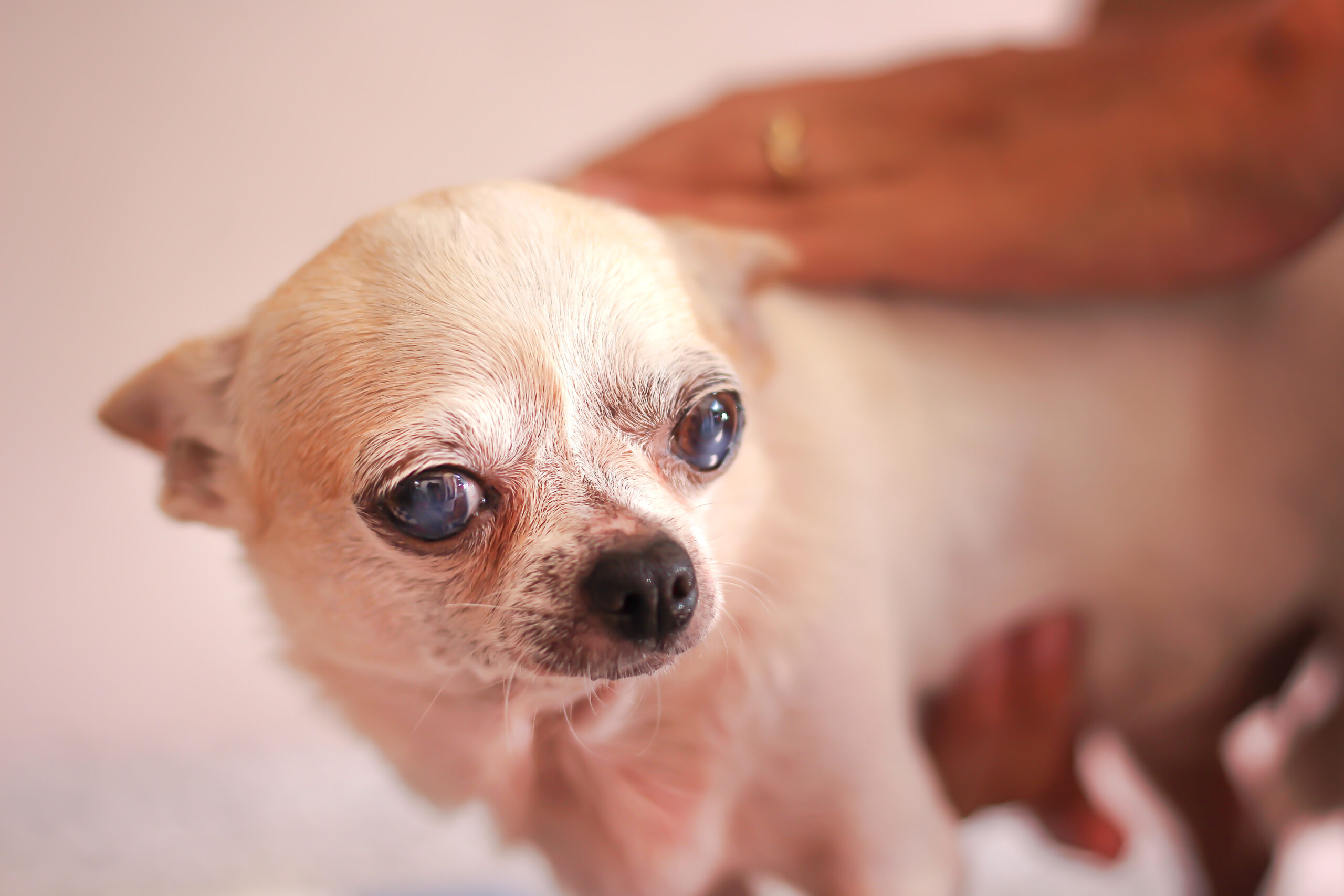Just as our eyesight changes as we age, your dog’s eyes are likely to undergo some changes, too. Certain changes to the eye’s lens, known as cataracts, might become an issue.
Cataracts can result in several unpleasant symptoms for your pup, causing cloudiness, blurry vision, glaucoma, or even blindness.
If your dog is diagnosed with cataracts, your vet might recommend that you plan for dog cataract surgery, which can end up costing around $2,500 to $4,000 per eye.
Let’s break down the costs, treatment options, and more.
What causes cataracts in dogs?
Cataracts are a condition where the lens of the eye becomes cloudy, opaque, or less transparent, leading to a decrease in vision or even blindness. The lens, located behind the iris and the pupil, is responsible for focusing light on the retina, which then sends the visual information to the brain. When a cataract forms, it disrupts the normal passage of light through the lens, causing impaired vision.
While disease and trauma can cause cataracts, they can also be hereditary. Canine diabetes can cause some dogs to develop what’s known as diabetic cataracts. Some dogs may even have congenital cataracts when they’re born, though cataracts commonly occur with old age.
Dog cataracts can give your dog’s eyes a white or opaque appearance, and you might see white spots on your dog’s eyes. This eye condition creates cloudiness over your dog’s eye lens, restricting light from traveling through your dog’s eye.
If left untreated, cataracts can lead to inflammation in the eye and can become painful. They may also cause vision problems, blindness, glaucoma, and other conditions.
How much does dog cataract surgery cost?
The average cost of canine cataract surgery can range from $2,500 to $4,000 per eye.
If cataracts impact your dog’s quality of life, cataract surgery can help to relieve pain and improve your dog’s vision. During the surgery, a veterinary ophthalmologist will use ultrasonic waves to gently break up the lens and remove it. Then, the surgeon will replace your dog’s original lens with an artificial lens called an intraocular lens.
The surgery can reduce the loss of vision that your dog has experienced, and can relieve inflammation of the eye.
Before your dog has surgery, your regular vet will likely refer you to a veterinary ophthalmologist for a consultation. The ophthalmologist will evaluate your dog, including performing an eye exam and an ultrasound to look at your dog’s retina. Then, the vet will let you know if they’re a good candidate for surgery.
While it’s possible for a dog to develop cataracts in only one eye, it’s much more common for dogs to have cataracts in both eyes.
The cost of the surgery may vary depending on the veterinary ophthalmologist practice that you visit. Your vet can refer you to reputable practices in your area, and you can request quotes from multiple practices to determine which is the best fit for your needs.

What affects the cost of dog cataract surgery?
The cost of dog cataract surgery depends on several factors.
- Your dog will receive general anesthesia for the procedure, and the amount of anesthesia needed will depend on your dog’s weight. If your dog is larger, the more you’ll pay for anesthesia.
- Your dog may also need to be hospitalized overnight for monitoring after the surgery. The duration of the hospital stay will affect the overall costs of the surgery.
- Expect your vet to administer and send your dog home with some medications, too. Your dog may need oral medications for pain management, as well as eye drops for you to administer after the surgery.
- The vet might also send your dog home with a cone to wear to protect the eyes during recovery. You will pay more for a larger cone for a larger dog, while a smaller breed dog will require a smaller, slightly less-expensive cone.
Don’t forget to also budget for surgery follow-up appointments. During these checkups, your vet will monitor your dog’s healing and make any needed adjustments to your dog’s post-surgery care.
Which breeds are more likely to develop cataracts?
Certain dog breeds have a hereditary predisposition to cataracts:
- Boston Terriers
- Cocker Spaniels
- French Poodles
- Golden Retrievers
- Labrador Retrievers
- Miniature Schnauzers
- Siberian Huskies
- Springer Spaniels
What other treatments are available for cataracts?
Surgery is the only effective treatment for cataracts in dogs. Your vet may prescribe anti-inflammatory eyedrops to help reduce the inflammation and pain caused by cataracts.
Keep in mind that this medication may slow the cataracts’ progression, but it won’t reverse the symptoms, or stop the cataracts from progressing.
Can pet insurance help cover the costs of cataract surgery?
In many cases, yes!
The cost of dog cataract surgery can be prohibitively expensive, especially if your dog needs surgery in both eyes. Pet insurance can help to take the bite out of expensive vet bills.
For example, if your dog is diagnosed with cataracts and they have a Lemonade pet insurance policy, treatments like cataract surgery will likely be covered (keeping in mind things like your deductible and co-insurance).
But remember, if you notice a cloudy look to your dog’s eyes, if tests show abnormalities before you sign up for pet insurance, or other signs/symptoms (or during their waiting period for illnesses, which varies by state), your dog’s cataract treatments won’t be covered, because it would be considered a pre-existing condition. This is why it’s so important to get pet insurance before you notice anything wrong—if you wait, it may be too late to get coverage for these conditions.
Also, keep in mind that experimental and homeopathic treatments for cataracts or other illnesses would not be covered under a Lemonade Pet insurance policy.
Before we go…
Cataracts can have a major impact on your dog’s quality of life, leading to pain and even blindness.
While cataract surgery can be helpful, it’s expensive to pay for out-of-pocket. Investing in pet insurance for your dog can give you the peace of mind of knowing that you’re prepared, just in case your dog ever needs cataract surgery.
A few quick words, because we <3 our lawyers: This post is general in nature, and any statement in it doesn’t alter the terms, conditions, exclusions, or limitations of policies issued by Lemonade, which differ according to your state of residence. You’re encouraged to discuss your specific circumstances with your own professional advisors. The purpose of this post is merely to provide you with info and insights you can use to make such discussions more productive! Naturally, all comments by, or references to, third parties represent their own views, and Lemonade assumes no responsibility for them. Coverage may not be available in all states.





